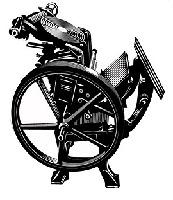- Posts: 5684
- Thank you received: 40
Was John Quincy Adams A "Founding Father"??
- PrintSmith
-

- Mountain Legend
-

Something the Dog Said wrote: And your understanding of Federalist 84 is so wrong it is laughable. In Federalist 84, Hamilton is expressing his viewpoint that the Bill of Rights should not be in the Constitution, that providing those individual rights was dangerous. As to whether or not the Supreme Court abandoned the principles of Federalist 84 is ridiculous as it has no application. Beginning with the McCulloch decision, and continuing through the Gibbons decision and on, the Supreme Court has upheld the principle of federalism.
Hamilton is saying that the Constitution, if adopted, will not have the power to limit the press, or establish a national religion, or disarm the public without need of a Bill of Rights. That the government will have no power in areas where no power was conferred to it. Where was the power conferred to tell a man how many acres of his own property could be cultivated in wheat? Where was the power conferred to the federal government that allows it to artificially determine what the cost of wheat will be? Regulation, the keeping regular, of interstate commerce? Please.For why declare that things shall not be done which there is no power to do?
He, with the complicity of Congress, threatened another coequal branch of government in order to force them to bend to his will and stop overturning the laws the complicit Congress and he were making that were being ruled unconstitutional on a regular and predictable basis. An exercise of tyranny of the majority in it rawest form. Do it my way or I and this Congress will put my justices on the court and get my way anyway. There is no appreciable difference between funding mechanisms of the Agricultural Adjustment Act and the Social Security Act. One was ruled unconstitutional prior to the threat being issued and one was ruled constitutional in the wake of that threat being issued. Enough said. FDR ultimately ended up seating 8 justices, 4 of whom were on the bench for over 20 years, 2 of which sat on the court for over 30. His appointments were a majority of the bench into the 1950's and the court was entirely composed of appointments made by FDR and Truman for 7 years between 1946 and 1953. Please don't attempt to minimize the consolidation of power that these justices perpetrated with their rulings. By the time Wickard v Filburn was decided in 1942 FDR had packed the court with 6 justices to implement his decrees from on high whether they were constitutional or not, which is precisely why the federal government was given authority to which it was not entitled under the Constitution with the complicity of FDR's packed court.Something the Dog Said wrote: You constantly blame the ills of the world on FDR court packing the Supreme Court. Once again, I have to correct you. The Judicial Procedures Act that FDR pushed to expand the Supreme Court so he could "pack" it was never, I repeat, never enacted. It failed. It never happened. It is yet one more conservative myth. FDR did get justices favorable to his agenda on the Supreme Court, but that was through his 12 years in office and the relatively short life span during the 30's and 40's.
The tyranny of the majority that FDR and Congress threatened with their court packing proposal was in 1936 - before the "relevant" decision you reference. By that time the court was properly cowed into rubber stamping whatever FDR did. A 5-4 decision in the wake of the "switch in time that saved nine" is hardly a convincing argument. What option did the justices of the court have? Overrule it as it should have been and throw the nation into constitutional chaos during the Great Depression when FDR and Congress made good on their threat? Perhaps we would now be better off if they had done just that rather than submit to the threatened usurpation and tyranny of the executive and a complicit Congress.Something the Dog Said wrote: In regard to the Wickard case, previously the Supreme Court had held that agriculture was an intrastate act not affecting interstate commerce. Clearly that is incorrect as most agriculture products or products that contain agriculture products are sold in interstate commerce and affect interstate commerce. The relevant decision is actually NRLB v. Jones & Laughlin Steel Corp. which expanded the definition of commerce in 1937 (prior to FDR getting his justices on the Court), not the Wickard case.
Please Log in or Create an account to join the conversation.
- LadyJazzer
-

- Mountain Legend
-

- Posts: 14880
- Thank you received: 27
..."and lions and tigers and bears, Oh My!"
Please Log in or Create an account to join the conversation.
- PrintSmith
-

- Mountain Legend
-

- Posts: 5684
- Thank you received: 40
I find it just a little bit too coincidental that in 1934 the federal government had no power to regulate or control agricultural production but it magically gained the power to do so 8 years later when 6 of the justices sitting on the court were appointed by the same executive that threatened to seat justices who would rule in his favor if the current ones kept overturning his agenda.
Please Log in or Create an account to join the conversation.
- LadyJazzer
-

- Mountain Legend
-

- Posts: 14880
- Thank you received: 27
Please Log in or Create an account to join the conversation.
- PrintSmith
-

- Mountain Legend
-

- Posts: 5684
- Thank you received: 40
Please Log in or Create an account to join the conversation.
- LadyJazzer
-

- Mountain Legend
-

- Posts: 14880
- Thank you received: 27
But with all those 9-year-old "Founding Fathers" running around, who KNEW?!?!
Please Log in or Create an account to join the conversation.
- PrintSmith
-

- Mountain Legend
-

- Posts: 5684
- Thank you received: 40
Please Log in or Create an account to join the conversation.
- 2wlady
-

- Mountain Legend
-

- Posts: 1100
- Thank you received: 0
http://education.yahoo.com/reference/dictionary/entry/Founding%20Father
American Heritage Dictionary
The founding fathers and slavery:
http://www.britannica.com/EBchecked/topic/1269536/The-Founding-Fathers-and-Slavery
Slaveholders (held slaves at some point in time)
"Charles Carroll Maryland
Samuel Chase Maryland
Adams Massachusetts
Benjamin Franklin Pennsylvania
Button Gwinnett Georgia
John Hancock Massachusetts
Patrick Henry Virginia
John Jay New York
Thomas Jefferson Virginia
Richard Henry Lee Virginia
James Madison Virginia
Charles Cotesworth Pinckney South Carolina
Benjamin Rush Pennsylvania
Edward Rutledge South Carolina
George Washington Virginia"
http://en.wikipedia.org/wiki/Founding_Fathers_of_the_United_States
"The newspaper publisher, Warren G. Harding, then a Republican Senator from Ohio, coined the phrase "Founding Fathers" in his keynote address to the 1916 Republican National Convention. He used it several times thereafter, most prominently in his 1921 inaugural address as President of the United States.[4]" (Bernstein, Founding Fathers Reconsidered, prologue (which collects all citations for Harding's uses of the phrase or variants thereof between 1912 and 1921). )"
All the research I've done does NOT include John Quincy Adams as a founding father in the sense that he was not a signer of the Declaration of Independence, he was NOT a delegate to the Constitutional Congress or the Continental Congress nor was he running around fighting the British.
Instead, he accompanied his father on some missions to France and went to Russia and Holland as a secretary and interpreter, while still a child.
Those are the facts. Are you going to rewrite the textbooks and send them to Texas for approval?
Please Log in or Create an account to join the conversation.
- AspenValley
-

- Mountain Legend
-

- Posts: 1955
- Thank you received: 0
PrintSmith wrote: You don't think someone who served in the executive branch of the government in 5 out of the first 6 administrations of a nation under a new Constitution can be or should be amongst those included in the founding generation? Really? You don't think he made any important contributions in establishing our current form of government? Surely you jest.
No, I don't. A "founding father" would be someone who was actively involved in drafting and/or ratifying the founding documents.
You of all people arguing against that???
Please Log in or Create an account to join the conversation.
- Something the Dog Said
-

- Mountain Legend
-

- Posts: 3444
- Thank you received: 11
All of which is your personal opinion, not supported by any facts.PrintSmith wrote:
Something the Dog Said wrote: And your understanding of Federalist 84 is so wrong it is laughable. In Federalist 84, Hamilton is expressing his viewpoint that the Bill of Rights should not be in the Constitution, that providing those individual rights was dangerous. As to whether or not the Supreme Court abandoned the principles of Federalist 84 is ridiculous as it has no application. Beginning with the McCulloch decision, and continuing through the Gibbons decision and on, the Supreme Court has upheld the principle of federalism.
Hamilton is saying that the Constitution, if adopted, will not have the power to limit the press, or establish a national religion, or disarm the public without need of a Bill of Rights. That the government will have no power in areas where no power was conferred to it. Where was the power conferred to tell a man how many acres of his own property could be cultivated in wheat? Where was the power conferred to the federal government that allows it to artificially determine what the cost of wheat will be? Regulation, the keeping regular, of interstate commerce? Please.For why declare that things shall not be done which there is no power to do?
He, with the complicity of Congress, threatened another coequal branch of government in order to force them to bend to his will and stop overturning the laws the complicit Congress and he were making that were being ruled unconstitutional on a regular and predictable basis. An exercise of tyranny of the majority in it rawest form. Do it my way or I and this Congress will put my justices on the court and get my way anyway. There is no appreciable difference between funding mechanisms of the Agricultural Adjustment Act and the Social Security Act. One was ruled unconstitutional prior to the threat being issued and one was ruled constitutional in the wake of that threat being issued. Enough said. FDR ultimately ended up seating 8 justices, 4 of whom were on the bench for over 20 years, 2 of which sat on the court for over 30. His appointments were a majority of the bench into the 1950's and the court was entirely composed of appointments made by FDR and Truman for 7 years between 1946 and 1953. Please don't attempt to minimize the consolidation of power that these justices perpetrated with their rulings. By the time Wickard v Filburn was decided in 1942 FDR had packed the court with 6 justices to implement his decrees from on high whether they were constitutional or not, which is precisely why the federal government was given authority to which it was not entitled under the Constitution with the complicity of FDR's packed court.Something the Dog Said wrote: You constantly blame the ills of the world on FDR court packing the Supreme Court. Once again, I have to correct you. The Judicial Procedures Act that FDR pushed to expand the Supreme Court so he could "pack" it was never, I repeat, never enacted. It failed. It never happened. It is yet one more conservative myth. FDR did get justices favorable to his agenda on the Supreme Court, but that was through his 12 years in office and the relatively short life span during the 30's and 40's.
The tyranny of the majority that FDR and Congress threatened with their court packing proposal was in 1936 - before the "relevant" decision you reference. By that time the court was properly cowed into rubber stamping whatever FDR did. A 5-4 decision in the wake of the "switch in time that saved nine" is hardly a convincing argument. What option did the justices of the court have? Overrule it as it should have been and throw the nation into constitutional chaos during the Great Depression when FDR and Congress made good on their threat? Perhaps we would now be better off if they had done just that rather than submit to the threatened usurpation and tyranny of the executive and a complicit Congress.Something the Dog Said wrote: In regard to the Wickard case, previously the Supreme Court had held that agriculture was an intrastate act not affecting interstate commerce. Clearly that is incorrect as most agriculture products or products that contain agriculture products are sold in interstate commerce and affect interstate commerce. The relevant decision is actually NRLB v. Jones & Laughlin Steel Corp. which expanded the definition of commerce in 1937 (prior to FDR getting his justices on the Court), not the Wickard case.
"Remember to always be yourself. Unless you can be batman. Then always be batman." Unknown
Please Log in or Create an account to join the conversation.





